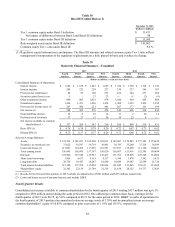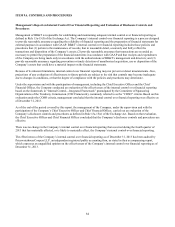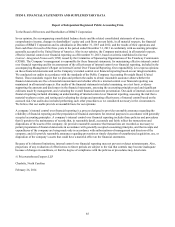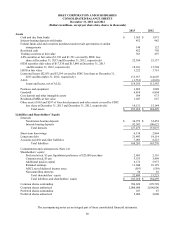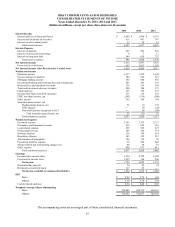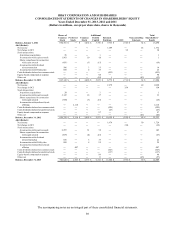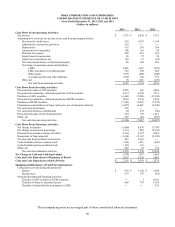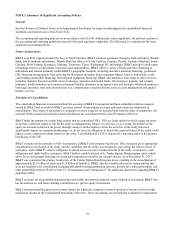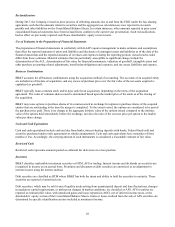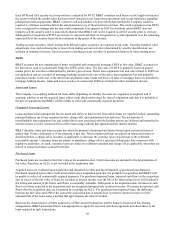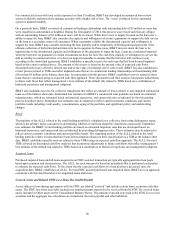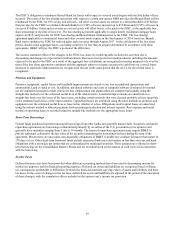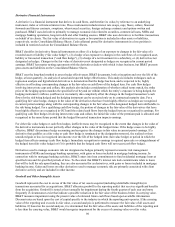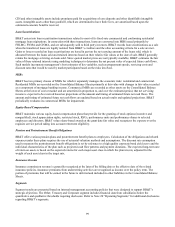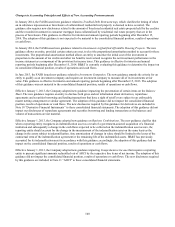BB&T 2013 Annual Report Download - page 91
Download and view the complete annual report
Please find page 91 of the 2013 BB&T annual report below. You can navigate through the pages in the report by either clicking on the pages listed below, or by using the keyword search tool below to find specific information within the annual report.91
NOTE 1. Summary of Significant Accounting Policies
General
See the Glossary of Defined Terms at the beginning of this Report for terms used throughout the consolidated financial
statements and related notes of this Form 10-K.
The accounting and reporting policies are in accordance with GAAP. Additionally, where applicable, the policies conform to
the accounting and reporting guidelines prescribed by bank regulatory authorities. The following is a summary of the more
significant accounting policies.
Nature of Operations
BB&T is an FHC organized under the laws of North Carolina. BB&T conducts operations through a bank subsidiary, Branch
Bank, and its nonbank subsidiaries. Branch Bank has offices in North Carolina, Virginia, Florida, Georgia, Maryland, South
Carolina, West Virginia, Kentucky, Alabama, Tennessee, Texas, Washington DC and Indiana. BB&T provides a wide range
of banking services to individuals, businesses and municipalities. BB&T offers a variety of loans and lease financing to
individuals and entities primarily within BB&T’s geographic footprint, including insurance premium financing; permanent
CRE financing arrangements; loan servicing for third-party investors; direct consumer finance loans to individuals; credit
card lending; automobile financing; factoring and equipment financing. BB&T also markets a wide range of other services,
including deposits; discount and full service brokerage, annuities and mutual funds; life insurance, property and casualty
insurance, health insurance and commercial general liability insurance on an agency basis and through a wholesale insurance
brokerage operation; trust and retirement services; comprehensive wealth advisory services; asset management and capital
markets services.
Principles of Consolidation
The consolidated financial statements include the accounts of BB&T Corporation and those subsidiaries that are majority
owned by BB&T and over which BB&T exercises control. Intercompany accounts and transactions are eliminated in
consolidation. The results of operations of companies or assets acquired are included only from the dates of acquisition. All
material wholly-owned and majority-owned subsidiaries are consolidated unless GAAP requires otherwise.
BB&T holds investments in certain legal entities that are considered VIEs. VIEs are legal entities in which equity investors
do not have sufficient equity at risk for the entity to independently finance its activities, or as a group, the holders of the
equity investment at risk lack the power through voting or similar rights to direct the activities of the entity that most
significantly impact its economic performance, or do not have the obligation to absorb the expected losses of the entity or the
right to receive expected residual returns of the entity. Consolidation of a VIE is required if a reporting entity is the primary
beneficiary of the VIE.
BB&T evaluates its investments in VIEs to determine if BB&T is the primary beneficiary. This evaluation gives appropriate
consideration to the design of the entity and the variability that the entity was designed to pass along, the relative power of
each party, and to BB&T’s relative obligation to absorb losses or receive residual returns of the entity, in relation to such
obligations and rights held by each party. BB&T holds a variable interest in its Tender Option Bond program trusts, which
allow for tax-advantaged financing of certain debt instruments issued by tax-exempt entities. As of December 31, 2013,
BB&T was considered the primary beneficiary of the Tender Option Bond program trusts, resulting in the consolidation of
approximately $2.0 billion of assets and $1.9 billion of liabilities. BB&T also has variable interests in certain entities that
were not required to be consolidated, including affordable housing partnership interests, historic tax credit partnerships, and
other partnership interests. Refer to Note 14 “Commitments and Contingencies” for additional disclosures regarding BB&T’s
significant VIEs.
BB&T accounts for unconsolidated partnerships and similar investments using the equity method of accounting. BB&T also
has investments in, and future funding commitments to, private equity investments.
BB&T has noncontrolling interests in certain entities for which the Company records its portion of income or loss in other
noninterest income in the Consolidated Statements of Income. These investments are periodically evaluated for impairment.



